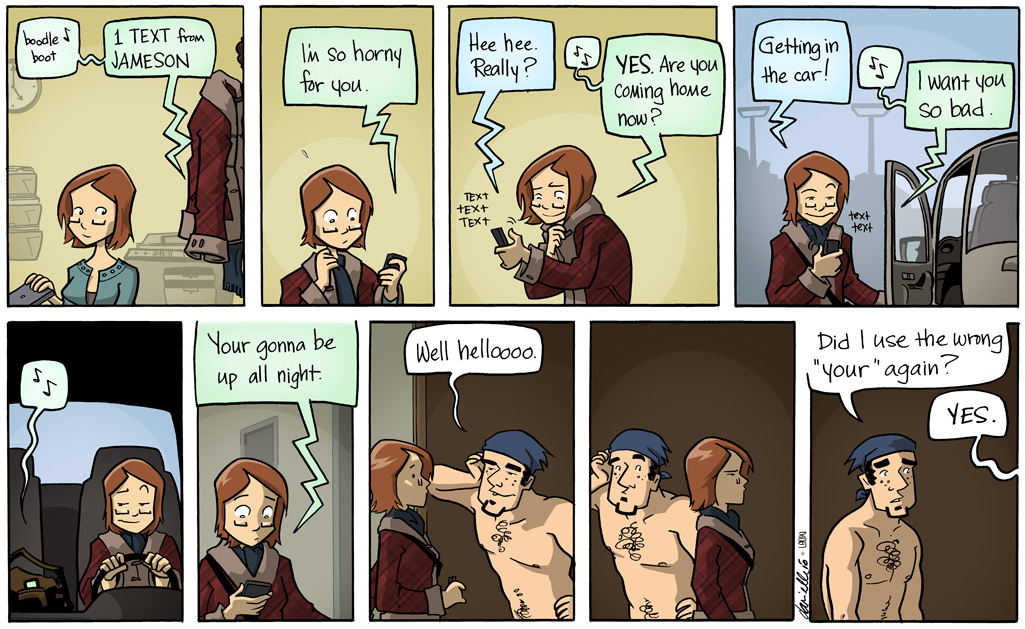Spelling
« previous post | next post »
This strip was recently reposted (colorized) in Danielle Corsetto's webcomic Girls With Slingshots:
The author's comment: "I use this strip as a litmus test for how much I'll have in common with someone new."
June 9, 2018 @ 12:11 pm · Filed by Mark Liberman under Linguistics in the comics
« previous post | next post »
This strip was recently reposted (colorized) in Danielle Corsetto's webcomic Girls With Slingshots:
The author's comment: "I use this strip as a litmus test for how much I'll have in common with someone new."
June 9, 2018 @ 12:11 pm · Filed by Mark Liberman under Linguistics in the comics
Powered By WordPress

bratschegirl said,
June 9, 2018 @ 7:16 pm
I often compose texts or emails on my iThing by dictating them rather than typing, but I have learned never to send without thorough proofreading. It's annoying how often Siri (or whichever gremlin is in charge in there) chooses the wrong option among there/their/they're, its/it's, etc. It/she/whatever seems incapable of discerning a possessive and therefore putting an apostrophe-s where it belongs, even in what seems like an utterly unambiguous context like "I'm going to be driving Dad's car tonight."
All of which is a very long-winded way of saying that, whether it's relevant to the comic or not, very often these things are the result of device error. And I really do wonder how this is going to affect the process of teaching "correct" usage, because if the iThing says it should be "your" instead of "you're," who am I to argue, many a user may think?
Laura Morland said,
June 9, 2018 @ 7:37 pm
The strip reminds me of my husband, a brilliant scientist who has never mastered certain spelling rules. When we first got engaged, my cousin Susan said, "You're going to marry a man who doesn't use "lay" and "lie" correctly? You must really love him!"
And yes, he also uses "your" for "you're," more often than not.
Twenty-one years on, my advice to "Jameson's" wife or girlfriend is to reevaluate her priorities. I exercise my grammar nerdiness in nearly all aspects of my life, but I've let my (otherwise) wonderful husband off the hook.
DaveK said,
June 9, 2018 @ 7:40 pm
@bratschegirk: after another five years of Siri, homophones will disappear
Michael Watts said,
June 10, 2018 @ 2:15 am
Homophones will never disappear, but they might stop being written differently.
Perhaps a more near-term solution would be to replace "your" and "you're" in text messages with the more idiomatic and all-purpose "ur".
Anarcissie said,
June 10, 2018 @ 10:42 am
The possessive apostrophe, based on a false history of English, should be abolished, which would save a lot of trouble and apostrophic ink.
Bloix said,
June 10, 2018 @ 12:17 pm
I believe I pronounce your and you're differently – yohr vs. yoor. I'm probably wrong but I believe it.
Ellen K. said,
June 10, 2018 @ 2:09 pm
I would interpret "ur" as representing something without the yod, that is ur=er. I'd go with "yer" or "yor" for a phonetic spelling of your/you're, depending on which pronunciation (stressed or unstressed).
Xmun said,
June 10, 2018 @ 7:12 pm
@Anarcissie
I agree. But the apostrophe in the contraction of "is" should be retained. The First Folio gets it right in the title "Loues Labour's lost".
ajay said,
June 11, 2018 @ 5:10 am
"The possessive apostrophe, based on a false history of English"
What's this referring to? Sounds interesting.
Simon Cauchi said,
June 11, 2018 @ 10:39 pm
@ajay
The apostrophe was and still is used to mark the omission of letters. It came to be used to mark the genitive (= possessive) because it was believed, wrongly, that "X's book", for example, was a contraction of "X his book", and the belief persisted even though in such phrases as "Sally's book" the 's was obviously not a contraction of "his". In fact, the s comes from the old genitive case, and in an inflected language like German there is no apostrophe. Goethe's Works, in German, is Goethes Werke. If there were any serious chance of spelling reform in English, one obvious improvement would be to make it "Goethes Works" in English too.
Graeme said,
June 13, 2018 @ 5:15 am
Imagine Bob Dylan's belle, receiving "Lay, Lady Lay, in knots over whether to peeve at him or not.
Rodger C said,
June 14, 2018 @ 8:59 am
I've seen, e.g., "Goethe's Werke" in German, but only with surnames, and only on very old books.